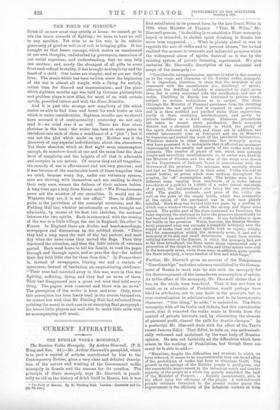THE FIELD OF HONOUR.* SOME of us now must stay
quietly at home : we cannot go to win the brave rewards of fighting ; we seem to have no call to any sacrifioe. Yet even to us the war, in its infinite generosity of good as well as of evil, is bringing gifts. It has brought us that lesser courage, which makes us unashamed of our own thoughts, undisturbed by grievances, unenvious of our social superiors; and understanding, that we may help one another; and, surely the strangest of all gifts to come from such refined brutality, it has brought us simplicity and the heart of a child, Our tastes are simpler, and so are our daily lives. The music which has been written since the beginning of the war is almost all simple, with a liking for melody, rather than for discord and impressionism; and the place which eighteen months ago was held by German philosophies and problem plays is now filled, for most of us, with certain untidy, pencilled letters and with the 1V'uno And it is just this strange new simplicity of life which makes us able to find time and heart for such books as this which is under consideration. Eighteen months ago we should have accused it of sentimentality ; yesterday we not only read it—we cried over it as well. There are four short sketches in the book : the writer has been at some pains to introduce into each of them a semblance of a plot " ; but it was not the plot which made us cry. Neither was it the discovery of any especial individualism about the characters. Yet these sketches, which at first sight seem commonplace enough, do somehow touch at one and the same time the dead level of simplicity and the heights of all that is admirable and complex in our nature. Of course they are all tragedies : the comedy of war is effervescent and not very genuine; and it was because of the unalterable truth of these tragedies that we cried, because every day, under our voluntary system, men are striving with themselves and are sending to death their only sons, women the fathers of their unborn babies. A long time ago a lady from Reims said:" We Frenchwomen . never ask the number of our casualties. It would not do. Whatever they are, it is not our affair." Here, in different guise, is the patriotism of the conscript countries; and Mr. . Fielding Hall has, whether intentionally or not, brought out admirably, by means of his first two sketches, the contrast between the two spirits. Each is concerned with the coming of the war to a little village, the one in England, the other in France. In England there are doubts and heart-searchings, newspapers and discussions in the cobbled street. "There they had a map upon the wall of the bar parlous., and each day when the news came they moved the flags. Than they discussed the situation, and then the little coterie of veterans parted. Each went home to tell his family, to read the paper 'through and through again, and so pass the day—for indeed their day held little else for them than this." In France there is, instead of newspapers, blazing war and a curtain of ignorance; instead of hesitation, an unquestioning obedience. "Their sons had marched away to this war, were in this war fighting, suffering, dying, and they had no news of them. They had disappeared into a great red mist that held every- thing. The papers were censored and there was no news."
The perception of the writer is keen and true. Only, since this perception has been freely used in the stories themselves, we cannot but wish that Mr. Fielding Hall had refrained from pointing the moral in each case in an annoying final paragraph : his heroic) little players are well able to make their exits with no accompanying soft music.














































 Previous page
Previous page